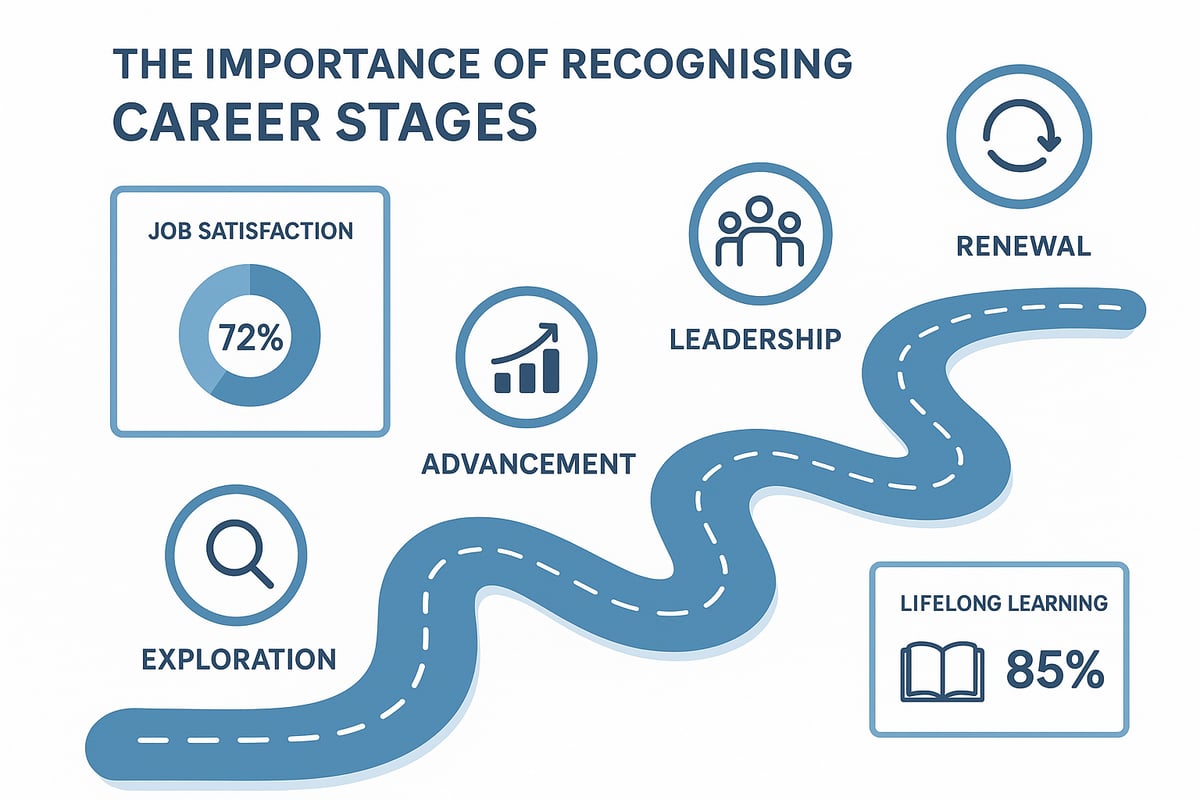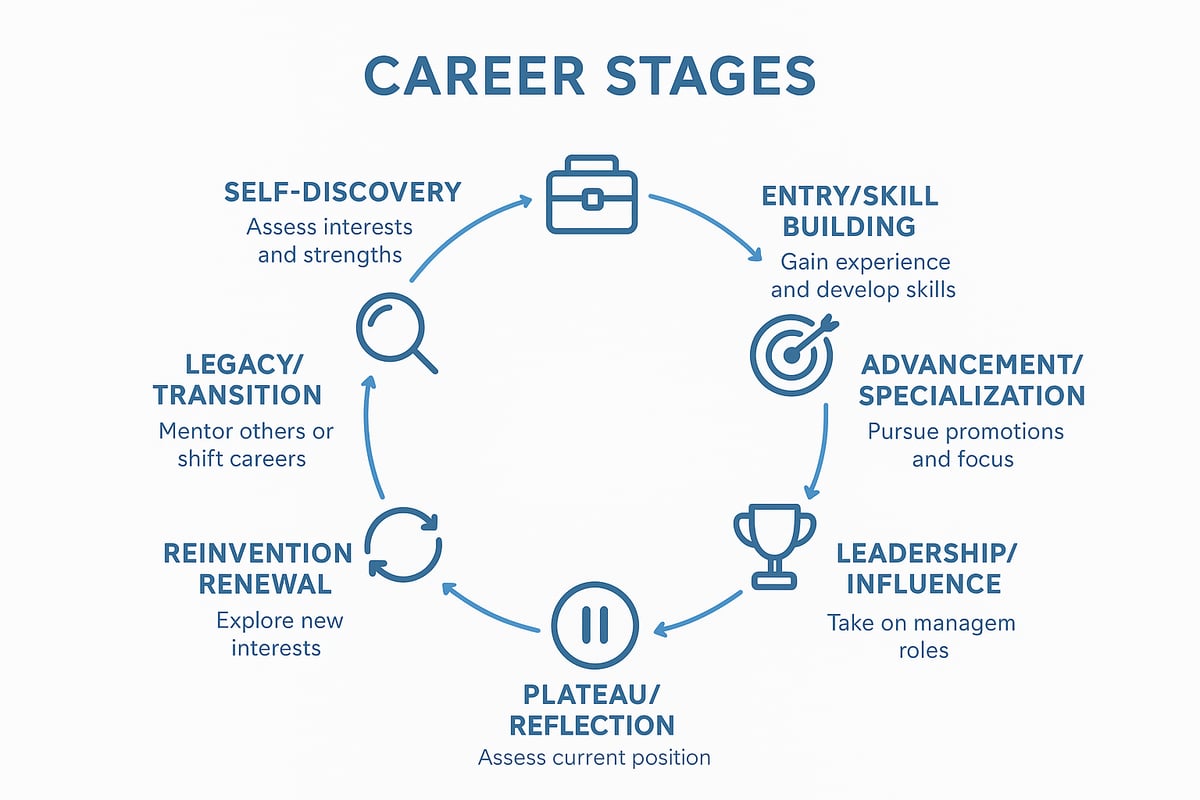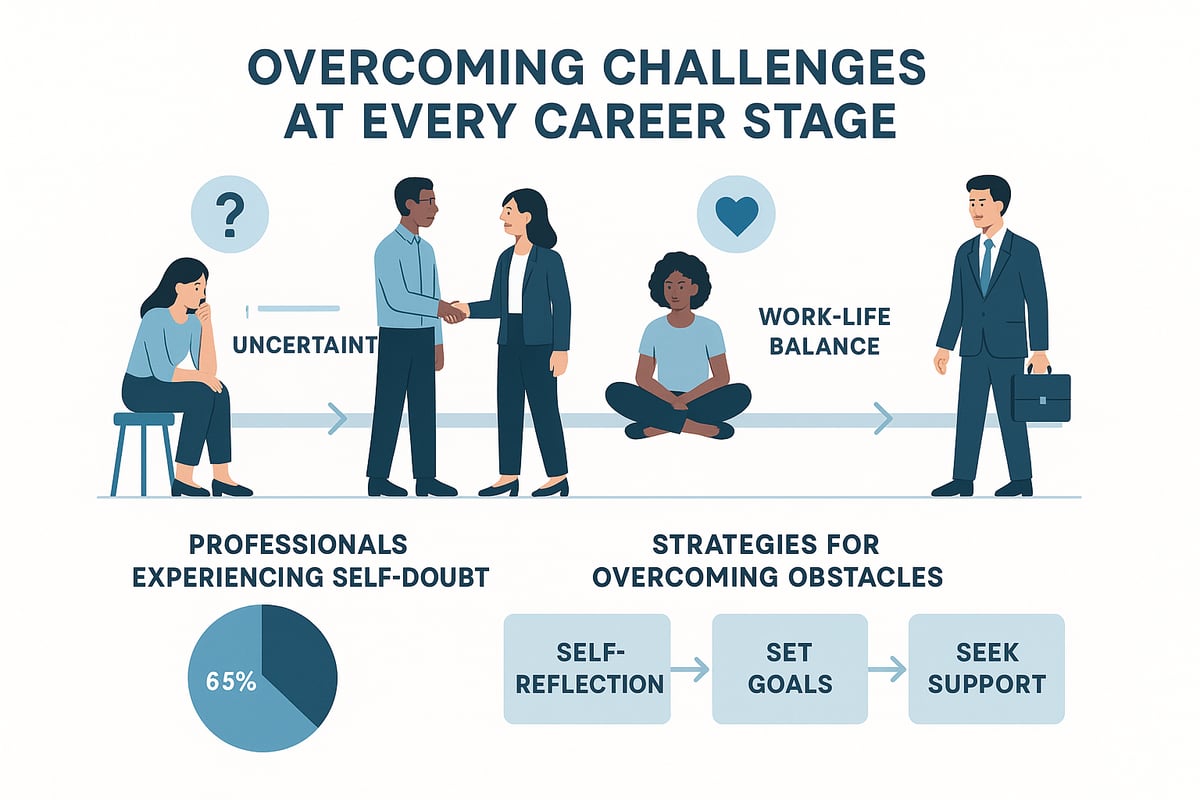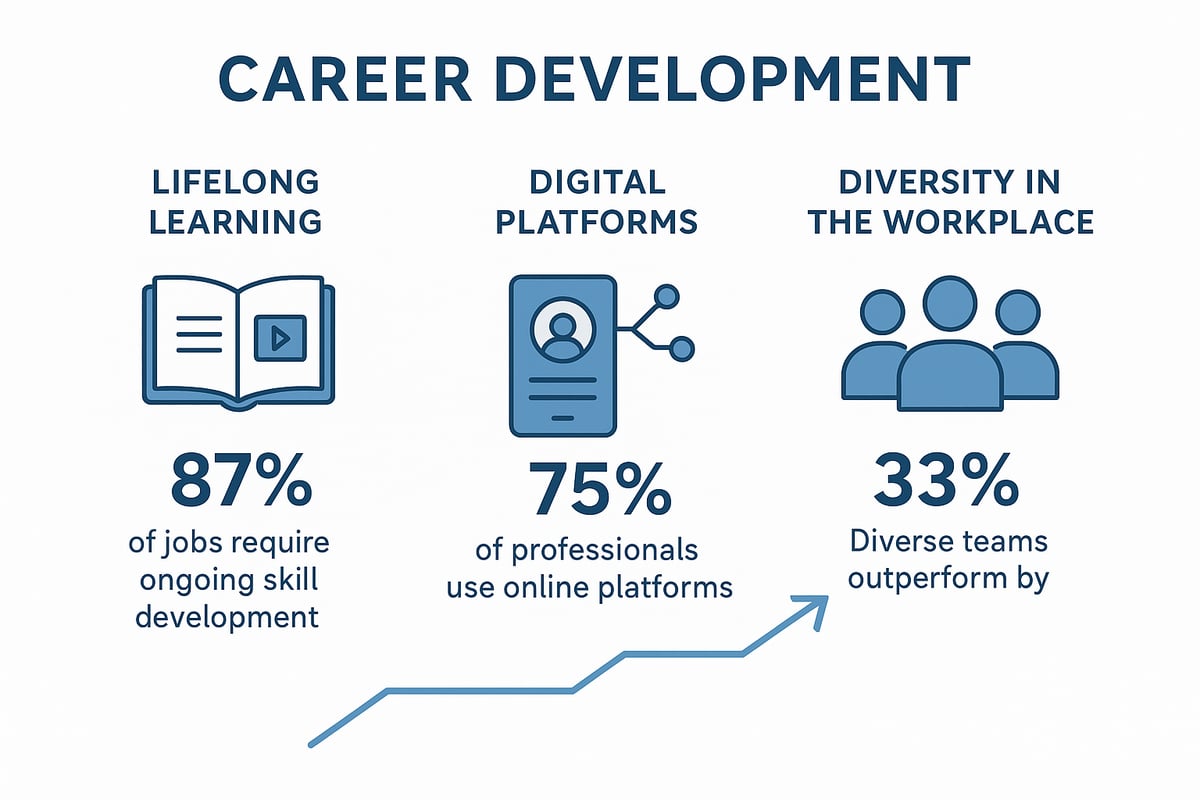In today's fast-paced world, career paths are evolving quickly, making it more important than ever to plan ahead. Have you ever wondered how some people seem to navigate their professional journeys with confidence and purpose?
Understanding the seven essential career stages can give you a strategic advantage. Each stage marks a new chapter, from self-discovery to leaving a legacy, and knowing where you stand helps you make smarter decisions.
By learning about these career stages, you gain insights that empower you to set clear goals, overcome obstacles, and reach your potential. Ready to take control of your future? Start applying this knowledge to your own journey and watch your career thrive.
The Importance of Recognising Career Stages
Understanding where you are in your professional journey can transform how you approach growth and success. By recognising your current position and what lies ahead, you can make smarter decisions, anticipate challenges, and seize opportunities. Let's explore why career stages are so valuable, how they are changing, and who stands to benefit the most.

Why Career Stages Matter
Career stages provide a clear roadmap for professional growth and transitions. When individuals understand the phases of their working life, they can better prepare for obstacles and spot new prospects on the horizon. Employers increasingly seek candidates who are aware of their own career trajectory, as this self-awareness signals motivation and resilience.
Research shows employees who plan their career stages are more likely to achieve job satisfaction and advancement. For instance, professionals who catch early signs of stagnation can proactively pivot or upskill. Awareness of career stages leads to stronger decision making and greater confidence in a changing job market. For deeper insight, see the Stages of Career Development.
Career stages are rarely linear, so adaptability is crucial throughout your journey.
How Career Stages Have Evolved
The nature of career stages has shifted dramatically due to technology, remote work, and globalisation. Traditional linear career paths are being replaced by more flexible, dynamic progressions. Today, it is common for mid-career professionals to reskill or even change industries entirely.
Career stages in the modern world are much more fluid, requiring ongoing learning and frequent reassessment. There is a growing demand for transferable skills, and lifelong learning has become a necessity. Professionals must now revisit and redefine their career stages regularly to stay relevant and competitive.
This evolution means that being comfortable with change and open to new opportunities is more important than ever.
Who Benefits from Understanding Career Stages
Everyone in the workforce can benefit from a clear understanding of career stages. Students, early-career professionals, and mid-level managers all face unique decisions and transitions. Employers also gain by retaining and developing talent aware of their professional journey.
For example, women in STEM often encounter distinctive challenges and opportunities at different career stages. Tailoring strategies to fit individual circumstances leads to better outcomes and higher satisfaction.
Ultimately, recognising and leveraging career stages helps individuals and organisations thrive in an ever-changing world.
The 7 Essential Career Stages Explained
Understanding the seven essential career stages is key to navigating your professional journey with clarity. Each stage brings unique challenges, opportunities, and decisions. By recognising where you are and what comes next, you can plan your growth, avoid stagnation, and make the most of every opportunity.

1. Self-Discovery and Exploration
The first of the career stages is all about understanding yourself. This is where you identify your interests, values, and unique strengths. Many people use internships, volunteering, or informational interviews to explore different fields.
Recent graduates often try various roles before settling on a specialism. Early exploration is strongly linked to higher long-term satisfaction at work. By taking time for self-assessment, you can ensure your chosen path aligns with who you are.
Using self-assessment tools can help clarify your direction. A solid foundation at this stage can prevent costly pivots later in your career.
2. Entry and Skill Building
Once you have identified your path, the next of the career stages involves entering the workforce and developing vital skills. This is where you secure your first role, learn the ropes, and adapt to a new workplace culture.
For example, STEM graduates joining graduate schemes or apprenticeships focus on building credibility and core competencies. Research shows 70 percent of employers prefer candidates who show adaptability.
Early skill acquisition is crucial for future advancement. At this stage, finding a mentor can accelerate your progress and help you avoid common pitfalls.
3. Advancement and Specialisation
As you move beyond entry-level roles, this stage is about seeking promotions, gaining certifications, or pursuing advanced degrees. You build your professional reputation by delivering results and expanding your network.
Employees who take on leadership projects or niche roles often see faster progression. Specialised professionals typically command higher salaries and greater job security. Strategic upskilling and networking are essential to maintain momentum.
Specialisation may mean moving laterally within your organisation too. For more on how to excel in this stage, see Advancing in STEM Careers.
4. Leadership and Influence
The fourth of the career stages involves stepping into leadership or thought leadership roles. Here, you develop strategic thinking, mentor others, and drive change within your organisation or industry.
Examples include becoming a team lead, department head, or an industry speaker. Organisations with diverse leadership often outperform others.
Leadership skills are crucial for achieving long-term impact. Influence can come from a formal title or from being recognised as an expert, making this stage both challenging and rewarding.
5. Plateau and Reflection
Many professionals encounter a plateau stage, where growth slows and work may feel routine. Recognising this stage is vital to avoid stagnation. Reflection, seeking feedback, and re-evaluating your goals are key actions here.
For example, someone might feel unchallenged after years in the same role. Around 40 percent of mid-career professionals consider a major change at this point.
Plateaus can be an opportunity for reinvention or taking on new challenges. Proactive reflection at this stage helps prevent burnout and keeps your career stages moving forward.
6. Reinvention and Renewal
This stage is about embracing change and adapting to new realities within your career stages. Many mid-career professionals reskill, change industries, or even return to education.
Career changes now occur every 7 to 10 years on average, reflecting the evolving job market. Successful reinvention requires a willingness to learn and step outside your comfort zone.
Lifelong learning is a real competitive advantage here. By embracing renewal, you stay relevant and fulfilled throughout your working life.
7. Legacy and Transition
The final stage in the career stages journey is about preparing for retirement, succession planning, and passing on your knowledge. Senior professionals often shift focus to consulting, volunteering, or mentoring.
Knowledge transfer is critical for organisational sustainability. Leaving a positive legacy ensures your impact continues after you step back from day-to-day work.
Transitioning out of traditional roles can be both rewarding and purposeful. This stage lets you reflect on your achievements and support the next generation.
Navigating Challenges at Every Career Stage
Navigating the unique hurdles that come with each of the career stages is a skill in itself. Whether you're just starting out or preparing for a major transition, understanding these challenges is essential for steady progress and personal confidence. Let's explore some of the most common obstacles, the power of mentorship and networking, and the importance of balancing your personal and professional ambitions.

Common Obstacles and How to Overcome Them
Every professional encounters obstacles during their career stages. Common issues include fear of change, imposter syndrome, and uncertainty about the next steps. For example, early-career individuals may doubt their abilities, while those further along might worry about stagnation.
| Obstacle | Example | Simple Strategy |
|---|---|---|
| Fear of change | Switching industries | Break big changes into steps |
| Imposter syndrome | Feeling unqualified | Seek feedback and mentorship |
| Lack of clarity | Unsure of next move | Set small, achievable goals |
Did you know that 60% of professionals experience self-doubt during transitions? The key is to recognise these feelings and act. Celebrating small wins, seeking honest feedback, and regularly checking your progress can make a significant difference at all career stages.
The Role of Mentorship and Networking
Mentorship and networking are powerful tools for overcoming barriers at every point in your career stages. A mentor can offer guidance, share experiences, and help you navigate tricky decisions. Networking, meanwhile, opens doors to new opportunities and perspectives you may not have considered.
For instance, women in STEM often use networks to access leadership roles or break into new fields. In fact, mentees are five times more likely to be promoted, highlighting the impact of support systems. Both giving and receiving mentorship build confidence and skill, making it invaluable throughout all career stages.
If you're looking to deepen your support network, explore Mentorship for Career Growth for practical insights and resources.
Balancing Personal and Professional Growth
Sustaining success across career stages means prioritising both your work and your well-being. Work-life integration is not just a buzzword; it's a necessity for long-term satisfaction and health.
Mid-career professionals, for example, often shift focus to family or personal interests. Data shows that work-life balance is a top factor in job satisfaction. Strategies like time management, setting clear boundaries, and self-care can help maintain this balance.
Remember, a sustainable career is built on holistic growth. Checking in with yourself and adjusting your approach ensures you thrive at every stage.
Adapting Career Strategies for the Future
As the world of work evolves, so must our approach to career stages. Navigating these stages successfully means staying proactive and flexible. With rapid technological changes and shifting workforce dynamics, adapting your strategies is essential for ongoing success and satisfaction.

Embracing Lifelong Learning
Continuous learning is now a non-negotiable part of all career stages. Professionals who invest in upskilling not only remain relevant but also unlock new opportunities as industries transform.
There are many ways to keep learning. Online courses, workshops, and micro-credentials offer flexible options to fit any schedule. For example, many people now use platforms like Coursera or LinkedIn Learning to stay ahead of trends. According to the Future of Jobs Report 2025, 87% of roles now require regular skill development, showing just how vital this is.
By making lifelong learning a habit, you will future-proof your journey through the different career stages. Whether you are starting out or considering a pivot, being open to new knowledge is your best asset.
Leveraging Technology and Digital Platforms
Digital tools are reshaping how we approach career stages at every level. From job searching to networking and building your personal brand, technology offers endless possibilities.
For instance, using platforms like LinkedIn can help you connect with mentors, join professional groups, and showcase your expertise. Virtual events and online mentorships also make it easier to expand your network globally. If you want to map out your next move, resources like Designing Your Career Roadmap offer step-by-step strategies for navigating transitions.
Embracing digital fluency will help you stand out and make the most of every stage within your career stages. Building a strong online presence is now just as important as your CV.
The Value of Diversity, Equity, and Inclusion in Career Progression
Inclusive workplaces are essential for success across all career stages. Diverse teams bring fresh perspectives, drive innovation, and create a culture where everyone can thrive.
For example, organisations that prioritise diversity and inclusion see higher performance and employee satisfaction. Women and underrepresented groups especially benefit from supportive environments that offer equal access to advancement and mentorship. Studies show that companies with diverse leadership outperform less diverse peers by 33 percent.
Seeking out employers who value inclusion can help you maximise your potential at every stage. By embracing diversity, you set yourself up for a more rewarding and resilient career.
FAQs: Career Stages and Professional Growth
How long does each career stage last?
Career stages can vary in length for each person. For example, the self-discovery stage may last several years, especially for those exploring different fields after school. Advancement and specialisation can extend over a decade, while reinvention might happen multiple times throughout a working life. The legacy stage often begins as retirement nears but can also start earlier for those who mentor or consult. Timelines are flexible, and transitions can happen at any age.
Can you move back and forth between stages?
Absolutely. Career stages are rarely a straight line. Many people return to earlier stages, such as self-discovery, after a career break or when considering a significant change. This fluidity is supported by the Life-span, life-space theory, which highlights how personal growth and external factors can prompt movement between stages. Adapting to new circumstances is a sign of resilience, not a setback.
What if I feel stuck in my current stage?
Feeling stuck is common in career stages, especially during plateaus or periods of reflection. If you notice a lack of motivation or challenge, consider seeking feedback from mentors or colleagues. Setting new goals, pursuing additional training, or taking on fresh responsibilities can help you move forward. Remember, career stages are designed to help you recognise when it is time for change, so use this awareness to your advantage.
Are career stages different for women in STEM or other underrepresented groups?
Women in STEM and other underrepresented professionals may face unique challenges at each stage, such as fewer role models or specific workplace barriers. Tailored support, strong mentorship, and inclusive networks are vital for navigating these career stages successfully. Platforms like Skills for Professional Success offer resources to help address these needs and promote growth. Personalising your approach can make a big difference in outcomes.
Now that we’ve explored how recognising each career stage can shape your path in STEM, it’s clear that support and the right resources make all the difference. You don’t have to navigate these transitions alone—surrounding yourself with a community that understands your journey is a real game changer. If you’re ready to take your next step, why not Join Us and become part of a network dedicated to empowering women at every stage? Let’s move forward together, share insights, and help each other grow within the dynamic world of STEM.
